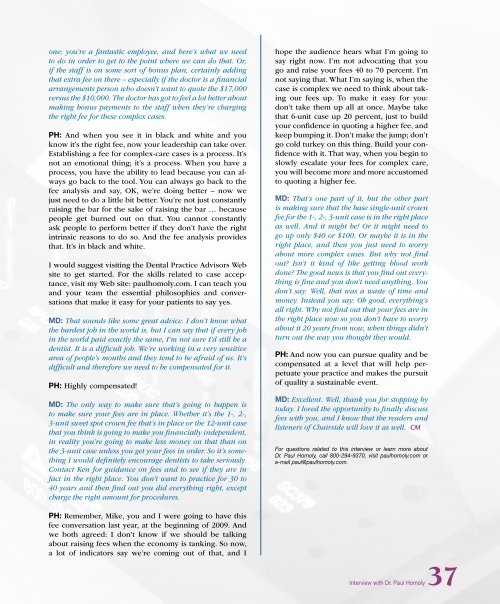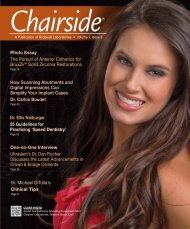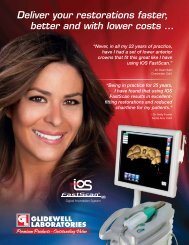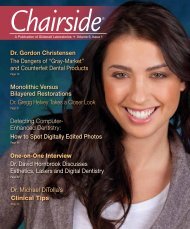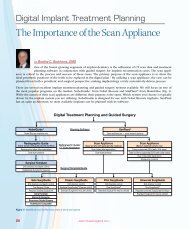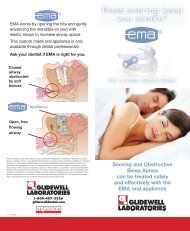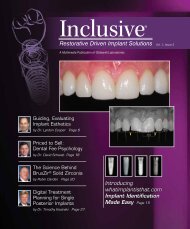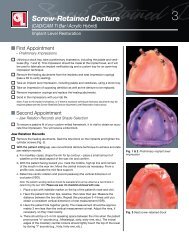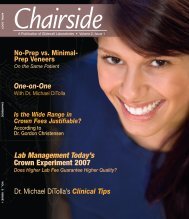PDF Version - Glidewell Dental Labs
PDF Version - Glidewell Dental Labs
PDF Version - Glidewell Dental Labs
Create successful ePaper yourself
Turn your PDF publications into a flip-book with our unique Google optimized e-Paper software.
one; you’re a fantastic employee, and here’s what we need<br />
to do in order to get to the point where we can do that. Or,<br />
if the staff is on some sort of bonus plan, certainly adding<br />
that extra fee on there – especially if the doctor is a financial<br />
arrangements person who doesn’t want to quote the $17,000<br />
versus the $10,000. The doctor has got to feel a lot better about<br />
making bonus payments to the staff when they’re charging<br />
the right fee for these complex cases.<br />
PH: And when you see it in black and white and you<br />
know it’s the right fee, now your leadership can take over.<br />
Establishing a fee for complex-care cases is a process. It’s<br />
not an emotional thing; it’s a process. When you have a<br />
process, you have the ability to lead because you can always<br />
go back to the tool. You can always go back to the<br />
fee analysis and say, OK, we’re doing better – now we<br />
just need to do a little bit better. You’re not just constantly<br />
raising the bar for the sake of raising the bar … because<br />
people get burned out on that. You cannot constantly<br />
ask people to perform better if they don’t have the right<br />
intrinsic reasons to do so. And the fee analysis provides<br />
that. It’s in black and white.<br />
I would suggest visiting the <strong>Dental</strong> Practice Advisors Web<br />
site to get started. For the skills related to case acceptance,<br />
visit my Web site: paulhomoly.com. I can teach you<br />
and your team the essential philosophies and conversations<br />
that make it easy for your patients to say yes.<br />
MD: That sounds like some great advice. I don’t know what<br />
the hardest job in the world is, but I can say that if every job<br />
in the world paid exactly the same, I’m not sure I’d still be a<br />
dentist. It is a difficult job. We’re working in a very sensitive<br />
area of people’s mouths and they tend to be afraid of us. It’s<br />
difficult and therefore we need to be compensated for it.<br />
PH: Highly compensated!<br />
MD: The only way to make sure that’s going to happen is<br />
to make sure your fees are in place. Whether it’s the 1-, 2-,<br />
3-unit sweet spot crown fee that’s in place or the 12-unit case<br />
that you think is going to make you financially independent,<br />
in reality you’re going to make less money on that than on<br />
the 3-unit case unless you get your fees in order. So it’s something<br />
I would definitely encourage dentists to take seriously.<br />
Contact Ken for guidance on fees and to see if they are in<br />
fact in the right place. You don’t want to practice for 30 to<br />
40 years and then find out you did everything right, except<br />
charge the right amount for procedures.<br />
hope the audience hears what I’m going to<br />
say right now. I’m not advocating that you<br />
go and raise your fees 40 to 70 percent. I’m<br />
not saying that. What I’m saying is, when the<br />
case is complex we need to think about taking<br />
our fees up. To make it easy for you:<br />
don’t take them up all at once. Maybe take<br />
that 6-unit case up 20 percent, just to build<br />
your confidence in quoting a higher fee, and<br />
keep bumping it. Don’t make the jump; don’t<br />
go cold turkey on this thing. Build your confidence<br />
with it. That way, when you begin to<br />
slowly escalate your fees for complex care,<br />
you will become more and more accustomed<br />
to quoting a higher fee.<br />
MD: That’s one part of it, but the other part<br />
is making sure that the base single-unit crown<br />
fee for the 1-, 2-, 3-unit case is in the right place<br />
as well. And it might be! Or it might need to<br />
go up only $40 or $100. Or maybe it is in the<br />
right place, and then you just need to worry<br />
about more complex cases. But why not find<br />
out? Isn’t it kind of like getting blood work<br />
done? The good news is that you find out everything<br />
is fine and you don’t need anything. You<br />
don’t say: Well, that was a waste of time and<br />
money. Instead you say: Oh good, everything’s<br />
all right. Why not find out that your fees are in<br />
the right place now so you don’t have to worry<br />
about it 20 years from now, when things didn’t<br />
turn out the way you thought they would.<br />
PH: And now you can pursue quality and be<br />
compensated at a level that will help perpetuate<br />
your practice and makes the pursuit<br />
of quality a sustainable event.<br />
MD: Excellent. Well, thank you for stopping by<br />
today. I loved the opportunity to finally discuss<br />
fees with you, and I know that the readers and<br />
listeners of Chairside will love it as well. CM<br />
For questions related to this interview or learn more about<br />
Dr. Paul Homoly, call 800-294-9370, visit paulhomoly.com or<br />
e-mail paul@paulhomoly.com.<br />
PH: Remember, Mike, you and I were going to have this<br />
fee conversation last year, at the beginning of 2009. And<br />
we both agreed: I don’t know if we should be talking<br />
about raising fees when the economy is tanking. So now,<br />
a lot of indicators say we’re coming out of that, and I<br />
Interview with Dr. Paul Homoly37


